For over a decade, the promise of LegalTech has tantalized the legal industry. From e-discovery platforms to practice management software, the vision was clear: streamline operations, reduce costs, and free lawyers to focus on high-value legal work. Yet, despite significant investment and innovation, many law firms and legal departments have found the journey fraught with challenges. The dream of seamless digital transformation often collided with a reality of fragmented systems, steep learning curves, and a lingering skepticism about true return on investment.
However, as we stand in mid-2025, a new paradigm is emerging. Artificial Intelligence, once a buzzword, is now demonstrably addressing many of the core issues that have historically plagued LegalTech adoption and effectiveness, ushering in an era of unprecedented efficiency. Legal tech specialists like LegalEase are leading the way with some of these newer solutions, such as Ai powered NDA drafting.
The Persistent Problems with Traditional LegalTech
Before AI’s widespread integration, LegalTech faced several significant hurdles:
- Fragmented Solutions and Integration Nightmares: The market exploded with niche tools, each excelling in one specific area. Firms often ended up with a patchwork of systems for document management, billing, e-discovery, contract analysis, and communication. Integrating these disparate platforms was (and often still is) a monumental task, leading to data silos, manual data entry, and workflow bottlenecks.
- Steep Learning Curves and User Adoption: Many early LegalTech solutions, while powerful, were not intuitively designed. Lawyers, already pressed for time, found the effort required to master new software prohibitive. Low user adoption rates meant that expensive software often sat underutilized, failing to deliver its promised benefits.
- Data Overload, Not Data Insight: While tools helped manage vast quantities of data, extracting meaningful insights remained a human-intensive process. Reviewing thousands of documents, identifying relevant clauses, or predicting litigation outcomes still required significant manual effort, negating some of the efficiency gains.
- High Cost of Implementation and Maintenance: Beyond the initial license fees, the costs associated with customization, training, and ongoing IT support for complex LegalTech stacks were substantial, making it difficult for smaller firms or those with tighter budgets to justify the investment.
- Lack of Predictive Power: Traditional LegalTech was largely reactive or organizational. It helped manage what had happened or was happening, but offered little in the way of predictive analytics or proactive risk identification.
AI: The Catalyst for True Legal Efficiency
Enter Artificial Intelligence. Over the past few years, advancements in machine learning, natural language processing (NLP), and generative AI have begun to systematically dismantle these long-standing barriers, transforming the legal landscape from a reactive, labor-intensive model to a proactive, insight-driven one.
Here’s how AI is making profound efficiencies:
- Automated Document Review and Analysis: This is perhaps AI’s most impactful contribution. NLP-powered platforms can now review millions of documents in a fraction of the time it would take human lawyers, identifying key clauses, anomalies, relevant facts, and privileged information with remarkable accuracy. This drastically reduces the time and cost associated with due diligence, e-discovery, and contract review.
- Intelligent Contract Lifecycle Management (CLM): AI-driven CLM systems go beyond simple storage. They can automatically extract key terms, identify deviations from standard templates, flag potential risks, and even suggest alternative clauses. Generative AI is now assisting in drafting initial contract versions, significantly accelerating the negotiation and execution phases.
- Enhanced Legal Research: AI-powered legal research tools are moving beyond keyword searches. They can understand the nuances of legal questions, identify relevant precedents across vast databases, summarize complex cases, and even predict potential outcomes based on historical data, allowing lawyers to conduct more thorough research in less time.
- Predictive Analytics for Litigation and Risk: Machine learning models are analyzing historical litigation data to predict case outcomes, assess settlement probabilities, and identify potential risks before they escalate. This empowers firms and legal departments to make more informed strategic decisions, allocate resources more effectively, and proactively mitigate legal exposure.
- Streamlined Practice Management and Workflow Automation: AI is being integrated into practice management systems to automate routine administrative tasks like client intake, conflict checks, time tracking, and even initial client communications. This frees up administrative staff and junior lawyers, allowing them to focus on more complex, value-added activities.
- Personalized Legal Education and Training: AI can tailor learning modules for legal professionals, identifying knowledge gaps and suggesting relevant training materials, ensuring that legal teams remain at the cutting edge of legal developments and technological proficiency.
- Improved Client Experience: Chatbots and AI-powered virtual assistants are providing 24/7 basic legal information and initial client support, improving responsiveness and accessibility, particularly for routine inquiries.
The Road Ahead: Integration and Ethical Considerations
While AI is undeniably a game-changer, the journey isn’t without its next set of challenges. Ensuring seamless integration of AI tools into existing workflows, addressing data privacy and security concerns, and navigating the ethical implications of AI in legal decision-making are paramount. The legal profession must also adapt its training and education to equip future lawyers with the skills to effectively leverage these powerful tools. In the UK, we’re seeing the use of Ai push legal definitions to their limits, as content ownership is more skewed than ever. Local business owner Tony of Eldercroft homes, said that “other homes have copied our images, just upscaling them and editing them slightly with Ai”.
As of mid-2025, the narrative around LegalTech is shifting from one of unfulfilled promise to one of tangible transformation. AI is not just making legal processes faster; it’s making them smarter, more accurate, and ultimately, more accessible. For law firms and legal departments willing to embrace this intelligent evolution, the future of legal practice promises unprecedented levels of efficiency and strategic advantage.



































